The advance in genomic medicine has caused that the genetic tests for the diagnosis and the prediction in the sanitary area become increasingly important. Having new tools for the diagnosis of this disease is essential.
- What is Cystic Fibrosis?
- Which genes are related to the disease?
- The Cystic Fibrosis diagnostic using Agena Bioscience
- MassARRAY: a versatile platform
- Discover all the tests included in Assays by Agena!
What is Cystic Fibrosis?
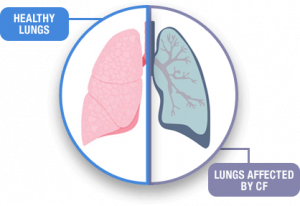 Cystic Fibrosis is a hereditary genetic disease that produces an alteration in the secretion of mucus, affecting many body systems, especially the respiratory and digestive systems.
Cystic Fibrosis is a hereditary genetic disease that produces an alteration in the secretion of mucus, affecting many body systems, especially the respiratory and digestive systems.
The mucus is a substance that lubricates and protects the surface of the respiratory tract, the digestive system, the reproductive system and many other organs and tissues. Cystic fibrosis produces a thickening and increased viscosity of mucus that accumulates and as a result breathing becomes difficult, and pulmonary infections and irritations occur. It can also impede the passage of digestive enzymes produced in the pancreas into the intestine that are necessary for proper digestion of food, producing diarrhea, malnutrition and weight loss.
Cystic fibrosis usually manifests during childhood, although in some cases (4%) it manifests in adulthood. Thanks to the development of palliative treatments, life expectancy is now much longer. Currently, gene therapy is being investigated as a possible treatment for cystic fibrosis.
Which genes are related to the disease?
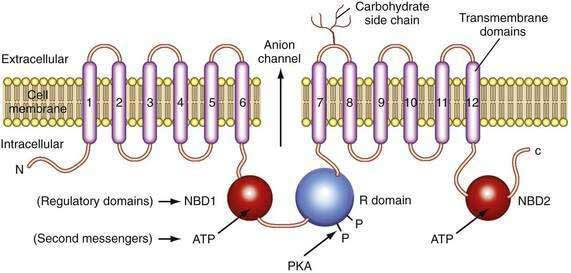
The CFTR gene (Cystic Fibrosis Transmembrane Conductance Regulator) encodes the transmembrane conductance regulator of cystic fibrosis, which is a protein whose main function is related to the transport of chloride ions through the cell membrane.
This gene is found on the long arm of chromosome 7 (7q31.2) and includes 27 exons of a 250-kb that give rise to a mRNA of 6,500 bp. This gene originates a protein called CFTR, of 1,480 amino acids and a molecular weight of 168 kDa. CFTR is regulated by cAMP, which at the same time regulates many other ion channels. The dysfunction of this channel affects multiple organs, especially the upper and lower respiratory tract.
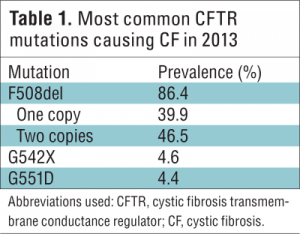
N Eng J Med 2015; 373: 220-231
To date, more than 1,400 different mutations have been described in this gene. Most mutations cause changes of individual amino acids in the CFTR protein or cause the elimination of a small portion of the amino acid sequence. The most frequent mutation causes the elimination of 3 base pairs in exon 10 of the gene and this causes the loss of a phenylalanine at position 508 of the protein. This change affects the stability and three-dimensional conformation of the protein and therefore, the ion channel never comes to be formed.
This disease is inherited with an autosomal recessive pattern, that is, both copies of the gene in each cell must have the mutation for the disease to occur. The parents of an individual with an autosomal recessive disease have a copy of the mutated gene, but usually do not show signs and symptoms of the disease.
The cystic fibrosis diagnostic using Agena Bioscience
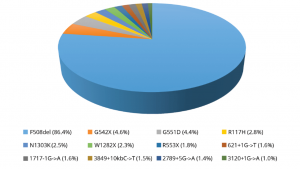
Currently, the American College of Medical Genetics (ACMG) and the American Congress of Obstetricians and Gynecologists (ACOG) recommend routine analysis of the most prevalent mutations of the CFTR gene to all couples who want to become pregnant. Different studies conducted in the United States and Europe indicate that> 86% of cystic fibrosis carriers are carriers of the F508del mutation. However, additional mutations must be analyzed to increase coverage. This fact is especially important for certain ethnic groups. To date, different laboratories have tested more than 100,000 samples for the CFTR gene using the MassARRAY equipment. Agena Bioscience ™ offers a custom panel based on a well-characterized CFTR HapMap from Coriell Biorepository (MUTCF-2).
MassARRAY: a versatile platform
The MassARRAY® system is a flexible platform that is flexible to analyze a wide variety of genetic analyzes. In such a way that in the same test we can analyze samples for oncological diagnosis, pharmacogenetics or a customized test for the diagnosis of a hereditary genetic disease such as cystic fibrosis. Using unlabeled oligonucleotides, generating customized assays is fast, simple and cost-effective.
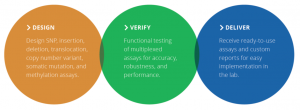
Agena Bioscience provides two different options for users interested in creating on-demand genotyping assays, somatic mutation detection or epigenetic assays. On the one hand, the user can develop his own panel using the online software Assay Design software or he can be advised by the scientific team that Agena Bioscience puts at his disposal.
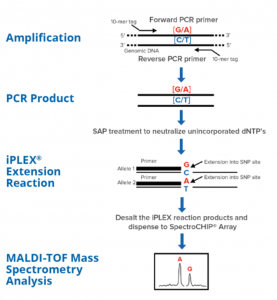
The MassARRAY system, being an open platform, allows to be flexible regarding the number of samples that can be processed and the number of tests. Thanks to the great capacity of multiplexing, the system allows analyzing tens to hundreds of genotypes and / or somatic mutations with very little starting material. The SpectroCHIP® are available in 96-well and 384-well formats. In such a way, that at full capacity, an instrument can process up to ten chips on the same day.
Discover all the tests included in Assays by Agena!
In general, each sample is subjected to a multiplex PCR using 10 ng of genomic DNA and followed by the extension of a single nucleotide thanks to the iPLEX® Pro reagents. The extended products are dispensed to the SpectroCHIP® Array and are detected by mass spectrometry using the MassARRAY equipment. Once the process is finished, an automated software issues a report with the number of calls produced for each mutation analyzed and its respective confidence value.
Do you have any question?
Si no te queda claro del todo cómo funciona esta tecnología, o quieres que te ayudemos a configurar tu ensayo, nuestro departamento técnico de especialistas, con amplia trayectoria en investigación (todos PhD), te pueden echar una mano: por mail (tecnic@labclinics.com), por tlf +34.934464700 o de forma presencial. Contáctanos y estaremos encantados de poder ayudarte!

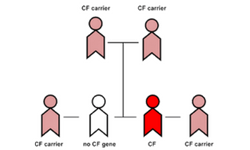



Leave a reply